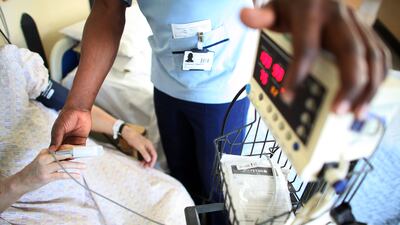An investigation by the British Medical Journal (BMJ) has accused several NHS trusts in England of paying some foreign doctors taking part in a training scheme less and offering them fewer benefits than other employees.
The publication claims some taking part in the programme, which offers foreign doctors two years’ experience in British hospitals, were paid “substantially less” than those employed by NHS trusts.
Almost 7,000 trainees from countries including Pakistan, India, Sri Lanka, Egypt, Nigeria and Saudi Arabia have taken part in the Academy of Medical Royal Colleges’ Medical Training Initiative (MTI) since it began in 2009.
A number of the doctors taking part are sponsored, while a proportion are directly employed by a trust.
The BMJ found an agreement between the College of Physicians & Surgeons Pakistan (CPSP) and three English NHS trusts led to trainees being paid less than those it employed directly.
It claims senior fellows from Pakistan who worked at the University Hospitals Birmingham trust as grade-three specialty trainee registrars, or at a higher level, were paid a stipend of between £2,700 and £3,600 ($3,275 and $4,368) a month by CPSP, which is the equivalent of £32,400 to £43,200 tax-free a year.
They are not guaranteed overtime pay or pay for on-call work, according to the BMJ.
According to NHS pay scales, ST3-grade doctors employed by the trust were paid £51,017 in 2022/23 and £55,328 a year in 2023/24 as a basic gross salary, excluding any overtime or enhanced-hours payments.
A spokeswoman for BMJ told The National some hospital trusts have a “specific agreement” with the CPSP under which the doctors from Pakistan are not employees of the trust.
"As part of this agreement they are paid a stipend by the College, which means they can be paid substantially less than their trust-employed counterparts and have fewer rights, like paid maternity leave.
“One doctor in Birmingham told the BMJ that her fellowship was terminated after she became pregnant in 2017. She described this incident as "traumatic’."
Michael Newman, an employment lawyer at legal firm Leigh Day, told the BMJ every worker is entitled by law to maternity leave after they begin employment, and to statutory maternity pay after 26 weeks of employment.
He described the conditions of the scheme as “exploitative”.
It is not known for which trust the doctor worked.
One of the trusts involved in the complaint, Dudley Group NHS Foundation Trust, told The National it was proud of its relationship with the Medical Trainee scheme, which it developed with the CPSP.
“In accordance with our agreement, our trainees benefit from a bursary provided by the college, supplemented by a comprehensive package that includes accommodation, equal opportunities in training, on-call support and avenues for career advancement,” a spokeswoman for the trust said.
“As we do not directly employ staff who are a part of the Medical Trainee scheme, we are therefore not responsible for their remuneration.
“Our trust has not received any concerns from our MTI colleagues, however, should they have any that they would like to raise with us directly, we would be more than happy to look into them.”
However, the Academy of Medical Royal Colleges called the issues raised by the BMJ investigation “very concerning”.
It added: “All doctors should be paid the correct rate for their work, regardless of whether they are on the MTI scheme or not.
“But this is a matter between the doctor and the NHS organisation that employs them.”
In light of the investigation, CPSP is set to review and overhaul some guidelines but said the scheme had improved health care in Pakistan.
A representative for University Hospitals Birmingham NHS Foundation Trust said the programme “undoubtedly benefits the NHS system but in return it benefits the overseas healthcare structure”.
They added: “Programmes which encourage the upskilling of medical practitioners from countries with less-developed healthcare systems have been described by the WHO [World Health Organisation] as a ‘brain gain and not a brain drain’.”
Walsall Healthcare NHS Trust said it has recruited three MTI fellows under the CPSP scheme, who are due to start in November, but does not have any in post at present.
A spokesman said: “The job description, person specification and rota patterns have been reviewed and approved by the dean.”
An NHS representative said: “While the salary of these positions is agreed between the individual trust and their international partner, fellows play an important role in treating NHS patients at the same time as learning new advanced clinical skills in a high-quality and fair learning environment, before returning to their home country.”


